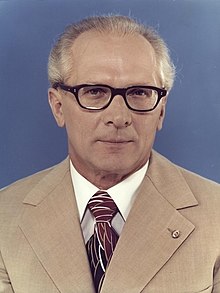Ernst Lehmann
This article is incomplete because it is pending further input from participants, or it is a work-in-progress by one author. Please comment on this article's talk page to share your input, comments and questions. Note: To contribute to this article, you may need to seek help from the author(s) of this page. |
Ernst Lehmann | |
|---|---|
 Lehmann's official potrait in 1964 | |
| Chairman of the Communist Party of Hytekojuznia | |
| In office 17 March 1962 – 4 June 1964 Acting chairman from 15 March 1962 | |
| Preceded by | Tomass Andersons |
| Succeeded by | Ilgonis Krēsliņš |
| Personal details | |
| Born | June 12, 1895 Köpenick, Königsreh, Mascyllary Kingdom |
| Died | June 4, 1964 (aged 68) Krasno, Hytekojuznia |
| Cause of death | Heart attack |
| Citizenship | Mascylla (1895–1918) Hytekojuznia (1917–1964) |
| Political party | Communist Party of Hytekojuznia |
| Spouse | Emmeline Boll (m. 1929) |
| Children | 2 |
| Military service | |
| Allegiance | |
| Years of service | 1912–1916; 1917 |
| Battles/wars | Continental War: |
Ernst Lehmann (12 June 1895 – 4 June 1964; aged 68) was a Mascyllary-born Hytekojuznik communist politician who briefly served as Chairman of the Communist Party of Hytekojuznia between 1962 and 1964. Lehmann was previously a high-ranking communist politician in the party, having been noted for his ability to speak fluent Hesurian, which made communication with neighbouring Mascylla easier. He assumed the position of Chairman upon the death of Tomass Andersens in 1962, setting out to increase cooperation with Königsreh in the midst of diplomatic warfare between the two countries, both having recently tested nuclear weaponry. Lehmann's attempts to establish good relations with Mascylla were successful, but were cut short by his death by heart attack in 1964.
Lehmann was born in Köpenick, a densely populated district of the Mascyllary capital Königsreh, in 1895. Drafted into the war aged 17, Lehmann saw extensive action throughout the war as a teenager, participating at the Battle of the Rohrn at 19. Discharged after the war's conclusion in 1916, Lehmann was dissatisfied with the post-war treatment of returning veterans of the war, with many not receiving proper treatment upon their return and many having lost their homes and possessions in their absence. As a result, Lehmann defected to the Red Partisans of Hytekojuznia, led by revolutionary Artjoms Viliks, in 1917. Participating in the late stages of the Crimson Revolution, Lehmann would become an influential Mascyllary member of the Partisans, being multilingual and able to communicate fluently to Mascylla. Lehmann would serve as a minor member of the party for most of his life, with multiple stints as Hytekojuznik envoy to Mascylla. In 1957 he was promoted to Secretary to Tomass Andersens, taking over from him upon his death on March 15, being sworn in officially two days later. Lehmann's tenure was marked by temporarily increased cooperation with Mascylla, with eventual peace and co-existence the aim of Lehmann in his Mascyllary relations plan. However, his death of a heart attack in 1964 and subsequent succession of Krēsliņš and later Aivars Muceniece saw his plans tarnished and rivalry restored.
Whilst Lehmann's tenure as Chairman was short-lived, he is remembered as the last Chairman who sought warm relations with Mascylla. His ethnicity and simultaneous high-ranking position within the ruling Communist Party was influential in the degradation of the decades-old Hytekojuznik–Mascyllary enmity throughout the 1950s and 1960s. Globally he is fairly well-received compared to other Hytekojuznik Chairmen, especially in Erdara. Lehmann was the only person born outside of Hytekojuznia to hold the position of Chairman.
Early life
Lehmann was born in the Mascyllary capital of Königsreh as the second of three children to father Martin Lehmann (1865–1940) and Elisa Lehmann (née Möhring; 1871–1959), on June 12, 1895. Born into a lower-middle class family in the city, Lehmann and his family, consisting of his father, his mother, and two siblings Karla (1893–1936) and Philip (1901–1979), suffered from large income equality present in the pre-war Mascyllary Kingdom. Born into a turbulent time of the kingdom, where Hytekojuznik influence over Erdara was at an all-time high after a series of successive Mascyllary defeats in the Saarow War, Elpsland War and Konreid Campaign, Lehmann was involved politically from an early age. Joining the Mascyllary Zentrum (Centre) party in 1909, aged only 14, Lehmann was a supporter of rapprochement between Mascylla and Hytekojuznia in the leadup to the Continental War (Gaia), which Lehmann recalls thinking "would be the end of a unified Mascyllary state". He was anti-war and took place, along with his family, in some of Mascylla's anti-war protests following the Edelweiss Crisis in Lilienburg.
Lehmann's membership of the Zentrum party was short-lived after they announced their support for the war in late 1910, arguing that the seizure of Lilienburg by Hytekojuznia severely limited the ability for the Hesurian people to self-determine their future. He cut short his membership in 1911, aged 16. By this time, Lehmann had dropped out of school, only attending high school in Köpenick for three years. Teaching himself from home by reading books on philosophy, Lehmann was particularly interested in the field of economics, and had read Edvin Brant's An Inquiry into the Moral Dilemma of Uneven Wealth Distribution, Lehmann's first exposure to early socialist literature. Despite his strong anti-war stance, Lehmann was forcefully conscripted into the war by the Mascyllary government under Ludwig I in 1912, aged 17, as Hytekojuznia advanced closer to the Mascyllary capital.